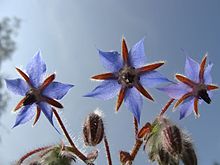Borage seed oil

Borage seed oil is derived from the seeds of the plant, Borago officinalis (borage).[1]
Borage seed oil has one of the highest amounts of
Biology
Effects
GLA is converted to
Uses
In
Several clinical studies have shown the oil to be ineffective at treating
Safety
Adverse effects
Borage oil may contain the
Patients should use borage oil that is certified free of toxic unsaturated pyrrolizidine alkaloids (UPAs).[1] Consumption of 1-2 g of borage seed oil daily can result in an intake of toxic UPAs approaching 10 ug.[1] The German Federal Health Agency specifies consumption to be limited to 1 ug of UPA daily.[1]
Borage oil may be unsafe during pregnancy because preliminary studies suggest borage oil has a teratogenic effect and that its prostaglandin E agonist action may cause premature labor.[1][9]
Seizures have been reported as a complication of ingestion of borage oil in doses of 1,500 to 3,000 mg daily,[10] although a mixed review of borage oil's effect on seizure thresholds indicates that borage oil quality varies.[11] A specific extraction process may offer purified products with 50%+ GLA content.
Borage seed oil might prolong bleeding time, increase the risk of bruising and bleeding, and increase the risk of bleeding during and after surgery.[2]
Interactions
Because borage oil can theoretically lower the seizure threshold due to its GLA content, it could therefore trigger a seizure in users of phenothiazines or tricyclic antidepressants.[1]
Use of NSAIDs with borage oil may theoretically decrease the effects of borage oil, as NSAIDs interfere with the synthesis of prostaglandin E.[1]
References
- ^ Sloan-Ketteringwebsite
- ^ a b c "Borage". WebMD. Retrieved 19 February 2014.
- S2CID 21396418.
- PMID 14670885.
- PMID 23633319.
- .
- ^ Parvais, O.; Vander Stricht, B.; Vanhaelen-Fastre, R.; Vanhaelen, M. (1994). "TLC detection of pyrrolizidine alkaloids in oil extracted from the seeds of Borago officinalis". Journal of Planar Chromatography--Modern TLC. 7 (1): 80–82.
- S2CID 94575246.
- PMID 11710548.
- PMID 21387119.
- S2CID 29280247.
